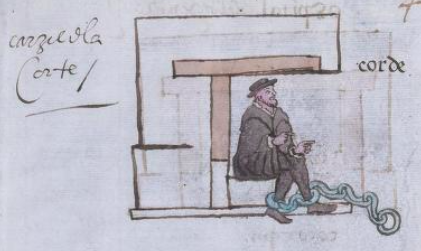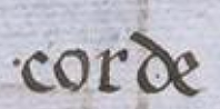corte (Osu6r)
This drawing of the jail of the colonial court (corte, taken into Nahuatl from Spanish) is provided here as an iconographic example, even while the subject is glyph-like. It comes from the Codex Osuna, folio 6 recto (or image 14) It shows a Spanish authority sitting inside a building (a typical calli-type building) in profile, facing toward the viewer’s right. The building is white with a brown T-shaped entrance. The person inside the jail has a full set of dark brown clothing, a hat, a beard, and he gestures with both index fingers. Unlike many similar figures, this man does not have a speech scroll emanating from his mouth; presumably, being imprisoned has meant the loss of his voice and therefore some of his authority. A turquoise-blue chain of six or seven links partly around his ankles presumably limit his mobility, and he is not sitting on the throne-like curule chair that others enjoy.
Stephanie Wood
The Nahuatl gloss says “corde,” with a slightly different orthography from the Spanish gloss, which says “carzel de la Corte” (jail of the Court). A similar chain to this one appears in this collection as Tepozmeca (literally, “Metal Cord”), the personal name of an Indigenous man. Also appearing in this collection is the court of Motecuhzoma, which has a similar architecture to this court. See below.
Stephanie Wood
1551–1565
Jeff Haskett-Wood
cárcel, cárceles, ilpia, cadenas, oficiales coloniales, cortes
corte, the court (a Spanish loanword taken into Nahuatl), https://nahuatl.wired-humanities.org/content/corte
la corte
Stephanie Wood
Library of Congress Online Catalog and the World Digital Library, Osuna Codex, or Painting of the Governor, Mayors, and Rulers of Mexico (Pintura del Gobernador, Alcaldes y Regidores de México), https://www.loc.gov/resource/gdcwdl.wdl_07324/. The original is located in the Biblioteca Nacional de España.
"The Library of Congress is unaware of any copyright or other restrictions in the World Digital Library Collection. Absent any such restrictions, these materials are free to use and reuse." But please cite the Biblioteca Nacional de España and this Visual Lexicon of Aztec Hieroglyphs if you use any of these images here or refer to the content on this page, providing the URL.


